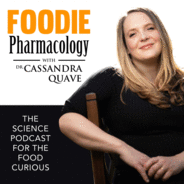The numbers are startling – 45% of all flowering plants are at risk of extinction. Did you know that replacing part of your lawn with native plants can create a sanctuary for local wildlife and support our planet's biodiversity? This week on the podcast, Dr. Quave speaks with Dr. Doug Tallamy, New York Times bestselling author of “Nature’s Best Hope” and founder of The Homegrown National Park. They delve into why native plants are essential for a healthy environment, how insects play a crucial role in our ecosystems, and offer practical steps individuals can take to enhance biodiversity in their neighborhoods.
#biodiversity #insects #planetaryhealth #nativeplants #podcast

Wissenschaft & TechnikEssen & Trinken
Foodie Pharmacology Podcast Folgen
Foodie Pharmacology is the science podcast for the food curious! Dr. Quave is co-creator and host of the show. She speaks with leading experts on certain crops, sustainable farming methods, medicinal plants, and explores the pharmacology--or health impact--of our food through weekly episodes! You can also tune in through subscribing to the podcast on Apple Podcasts. Leave comments and ratings on episodes! Dr. Quave loves to hear from the #FoodiePharmacology fans!
Folgen von Foodie Pharmacology Podcast
100 Folgen
-
Folge vom 06.05.2024Homegrown National Park with Dr. Doug Tallamy
-
Folge vom 29.04.2024Superhot with Troy PrimeauxIt’s time to turn up the heat! This week on the show, host Dr. Cassandra Quave speaks with Troy Primeaux of Primo’s Peppers! Troy developed the “7 Pot Primo” pepper, which arguably (and controversially) may just be the hottest pepper in the world. At an average face-melting 1.79 million Scoville heat units, one “7 Pot Primo” pepper is 360 times hotter than a Jalapeño! Troy shares his journey from the garden to creating an award-winning hot pepper sauce company and starring in the Hulu docuseries, Superhot! #pepper #hotsauce #foodie #podcast #superhot #hulu
-
Folge vom 22.04.2024Exploring Global Food Diversity and Nutrition with Dr. Anna HerforthFood is not just something we eat to fill our stomachs; there is diversity, culture, and nutrition in every bite! This week on the show, host Dr. Cassandra Quave speaks with Dr. Anna Herforth, senior research associate at the Harvard T.H. Chan School of Public Health. They discuss the importance of understanding the diversity of diets worldwide from a nutritional perspective and how different cultures' eating habits impact health. Dr. Herforth shares insights into the Global Diet Quality Project, which aims to conduct the first-ever global survey of what people eat, the challenges faced in gathering such data, and the innovative methods used to achieve it. The conversation reveals surprising findings about food diversity, the process of tailoring food surveys to different cultures, and the initiative's broader implications for nutrition and epidemiology research. They also talk about the upcoming launch of the World Food Map, a collaboration with the Periodic Table of Food Initiative, aimed at cataloguing the most common foods in every country and understanding their composition beyond traditional nutrients, emphasizing the critical role of food diversity in health. Happening this week (April 23-24), join Dr. Herforth and the PTFI team for a special symposium "Celebrating food diversity, scientific advances, and community innovation" (online or in person at New York Botanical Garden). More details and how to register at this link. This podcast is sponsored by The Periodic Table of Food Initiative in association with the American Heart Association. The views and opinions in this podcast are those of the presenters and represent the synthesis of science. For more information on the Periodic Table of Food Initiative, please visit https://foodperiodictable.org/ Global Diet Quality Project - dietquality.org World Food Map - worldfoodmap.org #nutrition #PTFI #foodways #foodmap #podcast
-
Folge vom 15.04.2024Saving Earth's Treasures: The Significance of HerbariaThis week on Foodie Pharmacology, host Dr. Cassandra Quave explores the importance of herbaria, focusing on their critical role in research, biodiversity conservation, and education. Dr. Quave, who became the curator of the Emory University Herbarium in 2012, discusses the challenges herbaria face, including funding and space, as illustrated by the recent closure of Duke University's herbarium. Through her experience and excerpts from relevant publications, Quave emphasizes the indispensable utility of herbaria in documenting plant species, contributing to climate change research, and supporting the discovery of new foods and medicines. She also makes a strong case for the preservation of herbaria, calling for support from the public and emphasizing the potential loss of invaluable resources for future generations if these collections continue to be undervalued and neglected. #herbaria #botany #science
